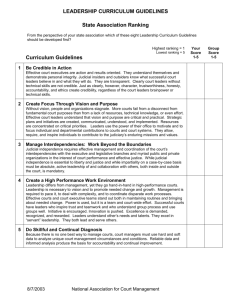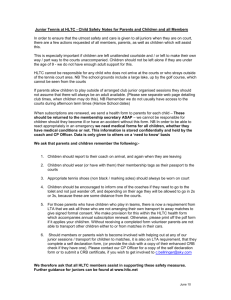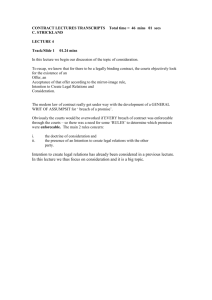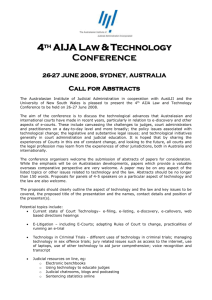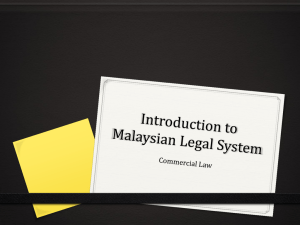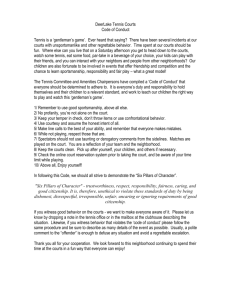Purposes KSA's Assessment: State Perspective
advertisement
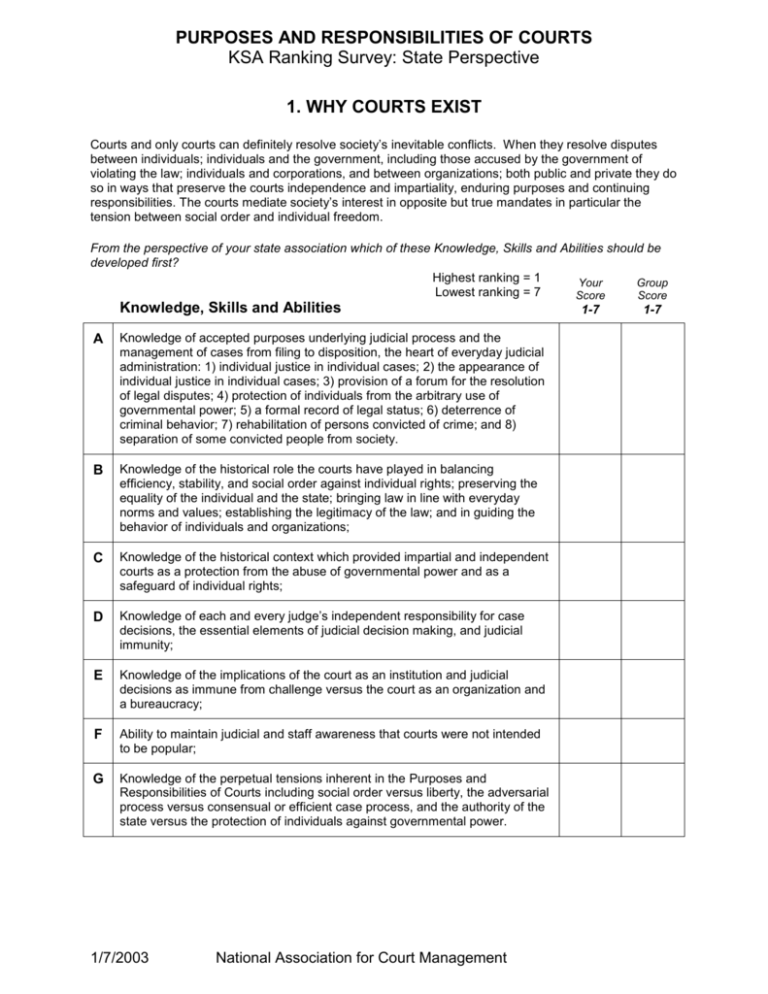
PURPOSES AND RESPONSIBILITIES OF COURTS KSA Ranking Survey: State Perspective 1. WHY COURTS EXIST Courts and only courts can definitely resolve society’s inevitable conflicts. When they resolve disputes between individuals; individuals and the government, including those accused by the government of violating the law; individuals and corporations, and between organizations; both public and private they do so in ways that preserve the courts independence and impartiality, enduring purposes and continuing responsibilities. The courts mediate society’s interest in opposite but true mandates in particular the tension between social order and individual freedom. From the perspective of your state association which of these Knowledge, Skills and Abilities should be developed first? Highest ranking = 1 Your Group Lowest ranking = 7 Score Score Knowledge, Skills and Abilities 1-7 1-7 A Knowledge of accepted purposes underlying judicial process and the management of cases from filing to disposition, the heart of everyday judicial administration: 1) individual justice in individual cases; 2) the appearance of individual justice in individual cases; 3) provision of a forum for the resolution of legal disputes; 4) protection of individuals from the arbitrary use of governmental power; 5) a formal record of legal status; 6) deterrence of criminal behavior; 7) rehabilitation of persons convicted of crime; and 8) separation of some convicted people from society. B Knowledge of the historical role the courts have played in balancing efficiency, stability, and social order against individual rights; preserving the equality of the individual and the state; bringing law in line with everyday norms and values; establishing the legitimacy of the law; and in guiding the behavior of individuals and organizations; C Knowledge of the historical context which provided impartial and independent courts as a protection from the abuse of governmental power and as a safeguard of individual rights; D Knowledge of each and every judge’s independent responsibility for case decisions, the essential elements of judicial decision making, and judicial immunity; E Knowledge of the implications of the court as an institution and judicial decisions as immune from challenge versus the court as an organization and a bureaucracy; F Ability to maintain judicial and staff awareness that courts were not intended to be popular; G Knowledge of the perpetual tensions inherent in the Purposes and Responsibilities of Courts including social order versus liberty, the adversarial process versus consensual or efficient case process, and the authority of the state versus the protection of individuals against governmental power. 1/7/2003 National Association for Court Management PURPOSES AND RESPONSIBILITIES OF COURTS KSA Ranking Survey: State Perspective 2. COURTS AS INSTITUTIONS Impartiality and independence demand courts that are separate from the executive and the legislature. But court purposes reflect a rich historical legacy that dictates both distinctive boundaries and interdependency. Competent court leaders understand separation of powers, judicial independence, and the inherent powers of the court. Alternative organizational arrangements to maintain the courts boundaries and to permit their effective management are likewise known. Direction provided by the Trial Court Performance Standards guide day to day court management. From the perspective of your state association which of these Knowledge, Skills and Abilities should be developed first? Highest ranking = 1 Your Group Lowest ranking = 10 Score Score Knowledge, Skills and Abilities 1-10 1-10 A Knowledge of the Trial Court Performance Standards, their values, and underlying principles: 1) Access to Justice; 2) Expedition and Timeliness; 3) Equality, Fairness, and Integrity; 4) Independence and Accountability; and 5) Public Trust and Confidence; B Knowledge of the founders’ theory, the Federalist papers, the Declaration of Independence, the U.S. Constitution and the Bill of Rights, separation of powers, judicial independence, and the parameters and constraints of the inherent powers of the courts; C Knowledge of Roscoe Pound’s 1906 ABA speech, “The Causes of Popular Dissatisfaction with the Administration of Justice” and its profound implications for understanding courts as institutions and everyday judicial administration; D Knowledge of historical changes in the roles of state and federal supreme courts, intermediate courts of appeal, and trial courts; E Knowledge of alternative governance structures for courts, including chief judges, judge committees, and joint public, executive, and legislative branch committees; F Knowledge of alternative structures for organizing courts, cases, and calendars; G Knowledge of various judicial selection methods and their theoretic and practical impact on the courts and their accountability; H Knowledge of the jury system and other public participation and presence in the courts; I Knowledge of therapeutic and restorative justice, current alternative approaches such as problem solving courts and alternative dispute resolution for civil and family cases, and their relationship to court purposes; J Ability to translate the values inherent to the Declaration of Independence, the Founders Theory, the U.S. Constitution, and the Bill of Rights into everyday practice. 1/7/2003 National Association for Court Management PURPOSES AND RESPONSIBILITIES OF COURTS KSA Ranking Survey: State Perspective 3. RULE OF LAW, EQUAL PROTECTION AND DUE PROCESS Effective court leaders understand and help courts deliver on the promise of rule of law, equal protection, and due process. They know the theory, the history of the common law, important concepts such as venue, justiciability, and their practical implications. All types of cases, their processing, and typical forms and procedures are understood. From the perspective of your state association which of these Knowledge, Skills and Abilities should be developed first? Highest ranking = 1 Your Group Lowest ranking = 9 Score Score Knowledge, Skills and Abilities 1-9 1-9 A Knowledge of the concept of the rule of law, growth of the common law, the common law adversarial system and other court-developed processes for truth-finding, discovery, narrowing the issues, and doing justice; B Knowledge of differing legal traditions (civil law, common law, and socialist law) and conflicting concepts of justice; C Knowledge of the processes by which the law is developed; D Knowledge of the concepts of equal protection, due process, venue, justiciability, case in controversy, and standing; E Knowledge of different types of jurisdiction; F Knowledge of all case types and the basis for organizing disputes in categories, and the processes and procedures that courts use to resolve disputes; G Knowledge of criminal and civil procedure and differing burdens of proof in criminal and civil cases; H Knowledge of the essential elements of due process of law in both civil and criminal cases including but not limited to notice; discovery; probable cause; bail; the right to counsel; confrontation; cross examination; the right to witnesses; privilege against self-incrimination; speedy, timely and public disposition of disputes; jury trial; and appellate review; I Ability to guide the organization and management of the court’s structure, administration, procedures, alternative dispute resolution, and traditional case processing by the concepts of rule of law, equal protection, and due process. 1/7/2003 National Association for Court Management PURPOSES AND RESPONSIBILITIES OF COURTS KSA Ranking Survey: State Perspective 4. ACCOUNTABILITY Courts must be accountable. Accountability provides the rationale for court control of the pace of litigation, the tracking of case disposition times, and adherence to law and judicial decisions in individual cases. The judiciary establishes and maintains its boundaries but it also assesses and reports on its performance, its use of public resources, and its conformance with its assigned responsibilities and the law. From the perspective of your state association which of these Knowledge, Skills and Abilities should be developed first? Highest ranking = 1 Your Group Lowest ranking = 10 Score Score Knowledge, Skills and Abilities 1-10 1-10 A Ability to design court structure, programs, processes, and daily operations consistent with the purposes and responsibilities of courts, public needs, and the court’s internal and external integrity and accountability; B Ability to articulate why the courts and their programs exist; C Ability to find ways to broaden access to justice, to increase the fairness and efficiency of the system, and to decrease public dissatisfaction with the courts; D Knowledge of our multicultural society, differing cultures, and the public’s understanding of and satisfaction with the courts; E Ability to make courts more understandable, accessible, and fair through application of hardware and software; F Ability to bring everyday judicial administration and case management in line with the purposes of courts, equal protection, due process, and the public’s right to timely and affordable justice; G Knowledge of why judicial decisions must be carried out as ordered; H Ability to deliver on the promise of the rule of law, equal protection, due process, and respect for all individuals, at the counter, on the phone, electronically, and at the bench and the bar of the court; I Ability to develop and use appropriate standards and measures of court performance and to assess and report on court performance internally, to funding authorities, the public, and the media; J Ability to align court performance, court structure, court operations, and court processes with court purposes. 1/7/2003 National Association for Court Management PURPOSES AND RESPONSIBILITIES OF COURTS KSA Ranking Survey: State Perspective 5. INTERDEPENDENCE AND LEADERSHIP The “contriving” American constitutional structure gives the judiciary’s relationship with its co-equal partners a distinctive flavor. Court leaders must be independent and cooperative. They must be above the fray even as they build and maintain boundaries and seek and achieve public trust and confidence. Court leaders have passion for justice and court purposes and responsibilities, and bring pride to everyday routines and jobs. They require ethical conduct and ensure that the court’s integrity is pure. From the perspective of your state association which of these Knowledge, Skills and Abilities should be developed first? Highest ranking = 1 Your Group Lowest ranking = 10 Score Score Knowledge, Skills and Abilities 1-10 1-10 A Skill in leading the third branch and the justice system and in engaging the judiciary, the public, and the other branches in collaborative problem solving and needed change; B Skill in working effectively with the leaders of the other branches without sacrificing the judiciary’s independence and impartiality and in drawing the line between judicial autonomy and judicial independence; C Ability to balance judicial independence, the inherent powers of the courts, and impartial judicial case processing and decisions with the judiciary’s need to cooperate with others; D Ability to focus staff and judges on issues, which will impact the court’s purposes and responsibilities, its core processes, and justice system issues; E Ability to be committed, passionate, courageous, and energetic about court purposes and responsibilities and the courts as institutions; F Ability to recruit, hire, and educate staff to maintain the court’s independence, impartiality, and integrity; G Skill in instilling in court staff an understanding of the role, purposes and responsibilities of courts, how they guide their everyday work, and why court management is a high calling; H Knowledge of ethics and conflict of interest concepts, regulations and laws that constrain lawyers, judges, and court managers, including the ABA Code of Professional Conduct (for lawyers), the ABA Canons of Judicial Ethics (for judges), the Federal Code of Conduct, and the NACM Model Code of Ethics for Court Managers; I Ability to inspire others in the court family to act and to appear to act with high ethical standards, before, during, and after the court day; J Ability to lead the judiciary and the justice system and to take risks to fulfill the role of courts and justice. 1/7/2003 National Association for Court Management


